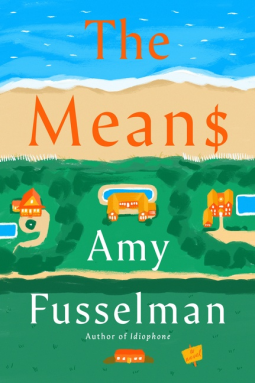Shelly Means has a lot of jobs. She takes care of her children. She takes care of her husband. She takes care of the dog. She takes care of their home. But she doesn’t get paid for any of these jobs, and she wonders about a society that doesn’t value these jobs enough to provide money to those who provide such services in their own homes. Maybe that’s why she’s so focused on getting her beach house. It’s what her vision board is all about, a beach house with a Japanese toilet.
However, there are obstacles to her getting her beach house. She and her husband George find a plot of land on Long Island where they can build, but building a house is very expensive. Shelly tries to save money towards her dream house and adds things to her vision board for it. But she also has to pay for the dog walker, their house cleaner, and her CBT therapy for when she threw a water bottle at the head of a speaker at the PTA meeting. That had ended her brief career as PTA president, but Shelly is okay with that. She just wants to focus on her beach house.
But then her husband loses her voiceover gig, and they have to cut back. But whether they have money or not, Shelly finds herself thinking about what it all means. She wonders if she is a bad person for wanting a beach house so badly. She wants to be valued for her contributions. She thinks about getting a job, but she doesn’t think her English degree will be enough to get her anything but a retail job. She consults a financial psychic. She talks with her dog Twix about the inequities of human life (he’s very wise).
But as Shelly juggles both the existential questions of financial literacy and the practical questions of her beach house, she learns more about what money is and how it can make a difference in a person’s life. Do you have to get paid for your work for it to have value? If you decide to build a house out of used shipping containers, does it matter what was in them before? Does transporting chicken nuggets offer your rescued shipping container home a better backstory than transporting shelves, and will potential renters think about that when they decide where to stay for a weekend at the beach?
The Means is a quirky family satire of being upper middle class in America and all the privilege and ethical questions that comes along with it. Author Amy Fusselman’s first novel takes a deep dive into how Americans think of family, of work, of wealth, and of ourselves in this dark and funny book.
I struggled a little with this book, as it is different. The way Fusselman has crafted this story is masterful but also unusual. It doesn’t read like a typical novel, or even a typical satire. I also had issues because I got sick in the middle of reading it and my brain just wasn’t processing at its best for a while there, which is my experience and I hope only mine. Had I not gotten sick in the middle, I would have had a lot easier time getting into the flow of the story. But either way, when I did get back into the novel, I greatly enjoyed both the storytelling and the overall message of The Means. It’s smart and sassy, with moments of genuine hilarity and moments of genuine strangeness, and I’m really glad I got to know Shelly and her journey to a beach house.
Egalleys for The Means were provided by Mariner Books through NetGalley, with many thanks.

